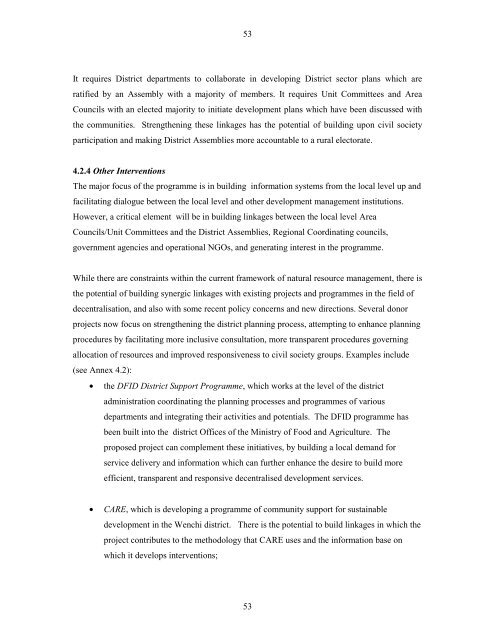Poverty Dimensions of Public Governance and Forest Management ...
Poverty Dimensions of Public Governance and Forest Management ...
Poverty Dimensions of Public Governance and Forest Management ...
Create successful ePaper yourself
Turn your PDF publications into a flip-book with our unique Google optimized e-Paper software.
53<br />
It requires District departments to collaborate in developing District sector plans which are<br />
ratified by an Assembly with a majority <strong>of</strong> members. It requires Unit Committees <strong>and</strong> Area<br />
Councils with an elected majority to initiate development plans which have been discussed with<br />
the communities. Strengthening these linkages has the potential <strong>of</strong> building upon civil society<br />
participation <strong>and</strong> making District Assemblies more accountable to a rural electorate.<br />
4.2.4 Other Interventions<br />
The major focus <strong>of</strong> the programme is in building information systems from the local level up <strong>and</strong><br />
facilitating dialogue between the local level <strong>and</strong> other development management institutions.<br />
However, a critical element will be in building linkages between the local level Area<br />
Councils/Unit Committees <strong>and</strong> the District Assemblies, Regional Coordinating councils,<br />
government agencies <strong>and</strong> operational NGOs, <strong>and</strong> generating interest in the programme.<br />
While there are constraints within the current framework <strong>of</strong> natural resource management, there is<br />
the potential <strong>of</strong> building synergic linkages with existing projects <strong>and</strong> programmes in the field <strong>of</strong><br />
decentralisation, <strong>and</strong> also with some recent policy concerns <strong>and</strong> new directions. Several donor<br />
projects now focus on strengthening the district planning process, attempting to enhance planning<br />
procedures by facilitating more inclusive consultation, more transparent procedures governing<br />
allocation <strong>of</strong> resources <strong>and</strong> improved responsiveness to civil society groups. Examples include<br />
(see Annex 4.2):<br />
• the DFID District Support Programme, which works at the level <strong>of</strong> the district<br />
administration coordinating the planning processes <strong>and</strong> programmes <strong>of</strong> various<br />
departments <strong>and</strong> integrating their activities <strong>and</strong> potentials. The DFID programme has<br />
been built into the district Offices <strong>of</strong> the Ministry <strong>of</strong> Food <strong>and</strong> Agriculture. The<br />
proposed project can complement these initiatives, by building a local dem<strong>and</strong> for<br />
service delivery <strong>and</strong> information which can further enhance the desire to build more<br />
efficient, transparent <strong>and</strong> responsive decentralised development services.<br />
• CARE, which is developing a programme <strong>of</strong> community support for sustainable<br />
development in the Wenchi district. There is the potential to build linkages in which the<br />
project contributes to the methodology that CARE uses <strong>and</strong> the information base on<br />
which it develops interventions;<br />
53
















